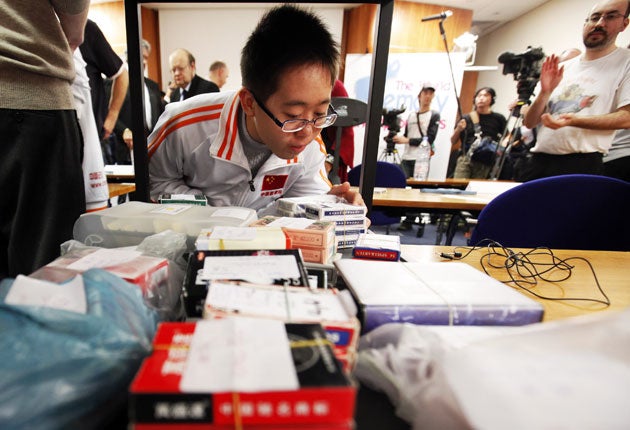An unforgettable memory contest
A Slice of Britain: Find it difficult to remember what you did last week, let alone the order of 1,144 cards? Don't despair: it's possible to train your mind – and age is no bar. The founder of the World Memory Championships is living proof

Your support helps us to tell the story
From reproductive rights to climate change to Big Tech, The Independent is on the ground when the story is developing. Whether it's investigating the financials of Elon Musk's pro-Trump PAC or producing our latest documentary, 'The A Word', which shines a light on the American women fighting for reproductive rights, we know how important it is to parse out the facts from the messaging.
At such a critical moment in US history, we need reporters on the ground. Your donation allows us to keep sending journalists to speak to both sides of the story.
The Independent is trusted by Americans across the entire political spectrum. And unlike many other quality news outlets, we choose not to lock Americans out of our reporting and analysis with paywalls. We believe quality journalism should be available to everyone, paid for by those who can afford it.
Your support makes all the difference.To the casual observer, the sight of rows and rows of heads all bowed in concentration in a drab London hotel basement is instantly forgettable. But for 74 competitors, this is the ultimate day to remember: to remember random words, number sequences and decks of cards. It was the final day of the World Memory Championships, an international war of wits.
The stakes are highest for Ben Pridmore, a 33-year-old accountant from Beeston, Nottinghamshire. The reigning World Champion is in silver medal position going into day three, and it is touch and go whether he'll retain his crown. Men's Health magazine may have named him one of six "superhumans", but that is little consolation when it comes to battling the combined grey matter of the 16-strong Chinese team in the afternoon's speed cards discipline.
If he hadn't fluffed the first of the decamentathlon events, the relatively easy abstract images round, then Mr Pridmore might not be chasing his mental nemesis, Germany's Johannes Mallow, coming into the last day. At least he'd made up ground in Friday evening's marathon event: the one-hour cards. Our man creamed it, memorising a whopping 22 decks – 1,144 cards – and trouncing the second-placed German, Simon Reinhardt, who managed just 20 packs.
Like Mr Pridmore, I, too, get off to a bad start: how stupid do I feel admitting to Tony Buzan, one of the championship's co-founders, that I've forgotten my business cards? I quickly blame my post-pregnancy mushy brain – a doctor friend had recently told me authoritatively, "it never recovers, you know". But unfortunately Mr Buzan isn't buying it: "The forgetful mum? That's rubbish," he snorts.
At least there's hope, because, apparently, it's all in the mind. "If you want to make your memory worse, all you have to do is think it isn't very good," says Mr Buzan, who has written more than 90 books about memory. He started the championships 18 years ago because he "wanted to demonstrate that memory was a much more powerful mental muscle than people realised, and that it can be trained and improved. And that it can get better as you get older."
Who better to prove that than the inaugural world champion, Dominic O'Brien, the school dunce who went on to win the event a further seven times? "Much to the surprise of my family and friends," he says.
The secret to his transformation – at the ripe old age of 34 – and the reason yesterday's competitors could memorise packs of cards and seemingly infinite sequences of numbers is a technique that turns random images, numbers, words or whatever into a mental image of people travelling along a familiar journey.
Later, after the day's surprisingly exciting speed cards round, Ronnie White, a US soldier who has served in Afghanistan, tells me he uses a mental journey around his old base in Kabul to help him recall the card sequence. So, in his base, he has: "Martha Stewart laughing at a guy lifting weights, which is the ace of hearts, ace of spades and the six of diamonds." The results are remarkable.
As an official arbiter, I am judging how well he does. He may be American but I'm really rooting for him. Judges have to stand statue-still while competitors memorise a shuffled deck before reordering a second deck into the same sequence. I hardly breathe as I watch him shuffle through his cards. It all looks promising but then, horror, he drops them and wastes five seconds picking them up.
The result? He mixes two up, which means that, although all the rest are correct, he scores a lousy eight points. "If I'd got those right, it would have been a new US record," he says. "But I was nervous, my hands were wet, the cards slipped." Thank God he doesn't blame the judge.
Although my man fails to make the grade, there is good news for the nation. Mr Pridmore trounces Mr Mallow in the final round. No one on the planet can memorise a deck quicker than his 24.97 seconds. His secret? He uses one image to memorise a pair of cards, so has to remember only 26 in all. He is thrilled. Whether he'll be able to hold off the fast-rising Chinese next year, when they will be on home turf, is another question.
At least for now, this is one international sport we invented that we are still capable of winning.
Join our commenting forum
Join thought-provoking conversations, follow other Independent readers and see their replies
Comments